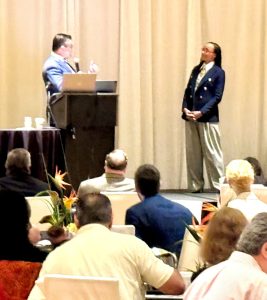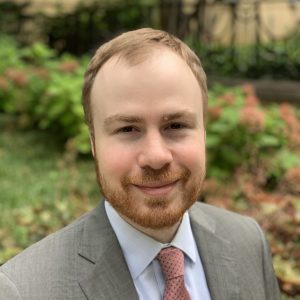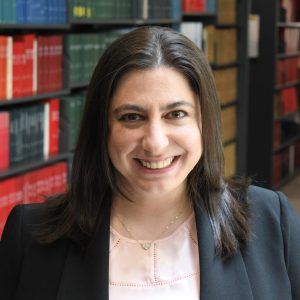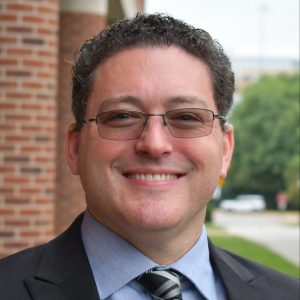Category: Faculty News

July 10, 2025
Professor David Gamage publishes article on e-commerce tax communication
Professor David Gamage published a University of Missouri School of Law Legal Studies Research Paper reporting research results from a study analyzing the tax communication practices of top e-commerce retailers and marketplaces. In the article, Gamage found a spectrum of tax communication practices, including many e-commerce businesses that did not collect sales tax did still inform customers about potential use tax obligations, though the transparency of this information varied. To read the full article, click here.

July 9, 2025
Professor Henson presents on AI
Professor Renee Henson presented on the ethical and practical use of AI for lawyers at the Bartlett Lecture Series.

July 8, 2025
Professor Gamage publishes article analyzing state business taxation
Professor David Gamage published a University of Missouri School of Law Legal Studies Research Paper examining tax scholar Karl E. Frieden’s arguments against strengthening state corporate income tax. In his article, “Beyond Blinders and Boomerangs: Assessing State Business Taxation,” Gamage argues that while Frieden does raise some valid points about the efficiency of specific tax design choices, his core argument fundamentally misconstrues the central issues: the ultimate incidence of business taxes, the pursuit of equity and efficiency, and the importance of combating harmful tax avoidance. To read the full paper, click here.

July 8, 2025
Professor Gouzoules interviewed on Seattle NPR
Professor Alexander Gouzoules interviewed by Seattle’s NPR station about the Supreme Court’s recent Mahmoud v. Taylor decision. To hear the full interview, click here.

July 1, 2025
Professor Gouzoules publishes book on the long-lasting impact of Scopes v. Tennessee
Professor Alexander Gouzoules co-authored a book, “The Hundred Years’ Trial: Law, Evolution, and the Long Shadow of Scopes v. Tennessee, which is out for purchase now. According to the publisher, Gouzoules, along with co-author Harold Gouzoules “explore the century-long impacts of the historic 1925 Scopes “Monkey Trial,” starting with the development of evolutionary theory and charting the resulting cultural and legal conflicts over evolution in the United States. Through a blend of legal history, scientific exploration, and cultural analysis, the authors reexamine how this landmark trial remains a pivotal moment in shaping modern debates on science, religion, and education.

June 26, 2025
Professor Gamage publishes paper on estate taxation
Professor David Gamage has published a new paper in the University of Pennsylvania Law Review discussing policies for estate taxation of mega-wealthy families. In his paper, “Taxing Dynasties,” Gamage and his co-authors analyze proposed tax reforms to prevent estate tax dodging among the super wealthy and find that those reforms would not suffice in curbing intergenerational transmission of vast wealth. The authors also suggest key criteria for transfer-tax reforms that would be successful in preventing estate tax dodging. To read the full article, visit here.

June 25, 2025
Professor Wechsler quoted in Boston Globe
Professor Rachel Wechsler was recently quoted in a Boston Globe article discussing a case of homicide: Rachel Wechsler, an associate professor at the University of Missouri School of Law who studies gender-based violence, said victims of violent crime often report low levels of satisfaction with the criminal justice system. Incidents like officers failing to arrest Boyette before he allegedly committed murder risk further damage to that relationship, she said.“It certainly can affect the opinion of the competency of people in the system,” Wechsler said. “It sounds like from the report that there…

June 23, 2025
Professor Rana publishes symposium essay on judicial representation
Professor and Assistant Provost Shruti Rana has published an invited symposium essay, Comparative Lessons for Enhancing Representation in the U.S. Judiciary—And Countering Democratic Decline, in Vol. 16 of ConLawNow. The essay argues that efforts to enhance judicial representation and parity in the United States could benefit from further drawing upon and building on international principles and comparative examples from other nations and international fora, and discusses how efforts to ensure greater representation and parity in U.S. Courts could enhance the rule of law and counter democratic decline during periods of intensifying contestation and erosion. This essay is based…

June 13, 2025
Professor Rana publishes article on international law and the rise of populism
Professor and Assistant Provost Shruti Rana has published an article, “International Law and the Rise of Populism,” in the Virginia Journal of International Law, co-authored with her colleagues on a current Australian Research Council grant examining how states interact with and challenge the international legal order. The article challenges the view that populism is merely a reaction against law, arguing instead that it emerges from tensions within liberal constitutional democracy itself. It reveals how shifts in international legal thought have contributed to the rise of populism by clashing with competing visions of political authority and legal normativity. Rana and her…

June 12, 2025
Professor Vacca quoted in Bloomberg Law
Professor Ryan Vacca was quoted in a Bloomberg Law article about the Federal Circuit taking the Trump tariff case en banc without a prior panel decision. “They have the authority to do this, but petitions for initial hearing en banc are super rare, and a court doing it sua sponte is even more rare,” Vacca said. Read the full story here.